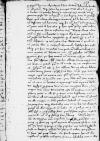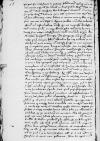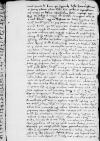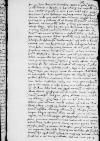Letter #1385
[Ioannes DANTISCUS] to Cornelis [DE SCHEPPER] & Godschalk ERICKSEN (SASSENKERLE)Löbau (Lubawa), 1535-12-23
English register:
Having long not received any message, and remembering De Schepper’s unfavourable horoscope, Dantiscus has been very worried for his life, so he is extraordinarily happy with the extensive letters just received. He is answering in haste so as to be in time to send the letter through the trusted messenger of the Gdańsk Town Council who delivered De Schepper’s letter. He apologises for his letter’s incoherence.
Dantiscus is pleased that De Schepper has stopped using pompous official titles towards him.
The news of the arrival in France of Queens Mary of Hungary and Eleanor of Austria had reached him earlier, together with the unconfirmed rumour that in connection with these visits the King of France [Francis I] had deceitfully seized a fortress from the Emperor [Charles V].
True to De Schepper’s advice, Dantiscus has forgiven his maligners and is of good cheer.
He agrees with De Schepper’s view on the fate of his letter from Székesfehérvár,dispatched to Dantiscus through [Hieronim] Łaski.He encloses a separate page about Fabian [Wojanowski] and Isabel [Delgada].He is pleased with the friendly feelings of De Schepper’s wife [Elisabeth Donche] and de Lord of Heule [Wouter van der Gracht], and with the good news about the Bailiff of Ghent [Arendt Sturm], his family and Michiel De Vriendt. He sends greetings to his friends from Ghent.
Dantiscus congratulates Friedrich [II of Wittelsbach] on his marriage to Dorothea [daughter of Christian II of Denmark], but offers the opinion that it would be better if he did not aspire to the Danish throne, due to differences in customs and not knowing the language. He supports the intention of Queen Mary to effect peace in Denmark, and is also counting on the effectiveness of De Schepper’s work upon his being delegated there by the Emperor. Dantiscus is not surprised that Duke Albrecht Hohenzollern supports his brother in law [Christian III], but agrees with De Schepper that peace should be established and freedom of navigation restored.
Dantiscus has sent a query to the people of Gdańsk as to the essence of their dispute with the people of the Netherlands and will pass their response on to De Schepper.
He intends to admonish the people of Gdańsk to keep to earlier agreements. He expresses a favourable opinion of Hieronim Łaski, and is glad that he has written to De Schepper about the Muscovy expedition and his troubles in Hungary. Dantiscus met with Łaski at the wedding of princess Jadwiga, daughter of the Polish King [Sigismund I]. The marriage had been negotiated with Dantiscus’ involvement, which aroused the anger of his maligners.
Dantiscus has had no news from Campensis. He regrets that the scholar no longer lives with him. He withdraws his earlier request for successive copies of the edition of the psalm paraphrases [by Campensis], which contains a succinct translation,because he learned that the author of this translation is Ulrich Zwingli.
Dantiscus expresses an unfavourable opinion of Zwingli. He asks for a copy of the Bible published recently in France.
Dantiscus is glad that his letter with the enclosed poem [IDP 188, Epistula ad singularissimum amicum dominum Cornelium Duplicium Scepperum, poem lost] met with the approval of De Schepper and his friends. He is worried that he has found mistakes in the copy he kept himself. Unless it was the secretary’s fault, he blames this on his old age, as he has already turned 50.
Dantiscus congratulates the Grudii brothers [Ioannes Secundus and Nicolaus Grudius] on their return to their native land. He also praises the Count of Nassau’s withdrawal from court life. He sends salutations to him and to the Count of Buren [Floris van Egmond], whose letter he recently received.
Dantiscus expresses a favourable opinion on the talents of Hernán Cortés and a negative one on the ungratefulness of Hieronymus Sailer, but even so does not renounce their earlier friendship. He recalls the favours he and Ulrich Ehinger rendered to Sailer in Augsburg.
He encloses a separate page about Lyncken, whose brother continues in his service.
So does the son of Mme de Baillieul [Carolus de Tautenberg] who became the most trusted of his pages, and the son of the [female] lute player from Brussels. Her son is studying organ playing. He sends news of his siblings and his mother [Christine Schultze].
He is happy that Godschalk [Ericksen] has regained his health. He extends greetings to the Counts of Emden [Enno and Johann Cirksena] and to Wolfgang von Affenstein.
He supports De Schepper’s mission as an envoy to the [Wendish] cities and insists that a peace treaty be signed. He is worried about the deteriorating situation in Denmark and expresses his sympathy for the daughter of King Christian II [Dorothea of Denmark], but refutes the claims on the Danish throne on her behalf.
He reminds of the disastrous consequences of the dynastic conflict in Hungary and stresses his longing for peace and stable commercial relations. He is pleased with news from Vienna that Jan van Leyden has been captured and sent to be tried by King Ferdinand. He hopes Wullenwever, arrested by the Bishop of Bremen Christoph von Brunswick-Lüneburg], will join him.He expresses regret at the deaths of the Bishop of Rochester [John Fisher] and Thomas More. He sends De Schepper a copy of the Pope’s letter to the King [Sigismund I] about the King of England’s [Henry’s VIII] conduct. He is counting on the Emperor dealing with this adulterer and murderer. He is worried about the safety of Eustace [Chapuys], who is on a mission as an envoy to the English court.
He thanks De Schepper for his report on Tunis and is pleased about the Emperor’s victories in Africa. He sends greetings to Langhessus [Heinrich Treusch von Buttlar].
He writes that the royal family is in Lithuania. He informs De Schepper of Hetman [Jan Amor] Tarnowski’s victories over Muscovy (including the capture of the Starodub fortress and the imprisonment of Fedor Ovchina-Telepnev-Obolensky) and of a planned expedition against the Wallachian hospodar [Radu VII Paisie] who attacked Pokuttya on Princess Jadwiga Jagiellon’s wedding day [29 August 1535]. He also informs De Schepper of the promotion of Bishops Andrzej Krzycki, Piotr Gamrat and Jan Chojeński after the death of Primate Maciej Drzewicki. Further changes will take place following the recent death of Piotr Tomicki. Dantiscus himself has no further ambitions.
Dantiscus sends greetings to De Schepper’s wife [Elisabeth Donche] and to his son [Cornelis jr.].
In a postscript addressed to [Godschalk] Ericksen, he thanks him for his postscript to De Schepper’s letter and the friendly feelings expressed in it.
Manuscript sources:
Auxiliary sources:
Prints:
| ||||||||||||||||||||||||||||||
Text & apparatus & commentary Plain text Text & commentary Text & apparatus Excerpts concerning Dantiscus' travels
Magnifice Domine et mi carissime Corneli.
Quod te vivum esse mihi Deo gratia vivo declarasti, incredibili gaudio me affecisti gestiensque non sine summa voluptate copiosas tuas cf.
Quod morem mihi gesseris relictis turgidis illis appellationibus seu titulis, quibus plerique nostro aevo gloriosiores sibi placent, meque nudis et amore nostro mutuo convenientibus verbis scribendo conveneris, gratissimum mihi fecisti utque hoc pacto mecum agas semper, a te pro iure nostrae amicitiae postulo. Ceterum et excusationem tuam, quod cf.  BCz, 244, p. 44
praeteriti praeter cf.
BCz, 244, p. 44
praeteriti praeter cf.
ms 1 dederi[...] hidden by binding⌈dederisms 2 dederis,
ms 1 dederi[...] hidden by binding⌉, libenter admitto. Non tam me angit litterarum tuarum desiderium, ms 2 quam,
ms 1 qu[...] hidden by binding⌈quamms 2 quam,
ms 1 qu[...] hidden by binding⌉ ut te sciam esse superstitem, qua in re tua olim mathesis,[1] quae ms 2 breviorem,
ms 1 b[...]viorem hidden by binding⌈brevioremms 2 breviorem,
ms 1 b[...]viorem hidden by binding⌉ tibi vitam polliceri videbatur, non parum interdum me ms 2 turbat,
ms 1 turba[...] hidden by binding⌈turbatms 2 turbat,
ms 1 turba[...] hidden by binding⌉, verum Deo fidendum est, qui omnium rerum posuit fines et terminos, quos antevertere et praevenire nemo potest. Illius benignitatem una tecum laudo et extollo, quod vivimus vivemusque, quamdiu illa permiserit in hac temporaria hic nostra superinscribed⌈nostranostra superinscribed⌉ amicitia, et deinde, ut ms 2 speratur,
ms 1 sper[...] hidden by binding⌈speraturms 2 speratur,
ms 1 sper[...] hidden by binding⌉, in illa aeterna, cum omnibus sanctis spiritibus communi perpetuo.
Quod scribis serenissimam
ms 1 ori[...] hidden by binding⌈orisms 2 oris,
ms 1 ori[...] hidden by binding⌉ Gallorum
ms 1 Gall[...] hidden by binding⌈Galliaems 2 Galliae,
ms 1 Gall[...] hidden by binding⌉
ms 1 quodda[...] hidden by binding⌈quoddamms 2 quoddam,
ms 1 quodda[...] hidden by binding⌉ munitissimum dolo ademisse, quod confictum esse puto, cum tu istius rei non ms 2 memineris,
ms 1 m[...]mineris stain⌈meminerisms 2 memineris,
ms 1 m[...]mineris stain⌉. Multae ad eum modum fabulae ad nos perferuntur.
Tuam iterum amicam admonitionem, qua me ms 2 confirmas,
ms 1 confi[...]mas hidden by binding⌈confirmasms 2 confirmas,
ms 1 confi[...]mas hidden by binding⌉ ac omnem molestiam, quam a meis calumniatoribus ms 2 pertuli,
ms 1 pertul[...] hidden by binding⌈pertulims 2 pertuli,
ms 1 pertul[...] hidden by binding⌉, excutere iubes, iam pridem exsecutus sum neque reliquum quicquam, quod me remordeat bonique omnia consulo propter eum,
cf. Vulg. Mt 5:44; Vulg. Lc 6:27; Vulg. Lc 6:35 diligite inimicos vestros ⌊qui et inimicos nos docuit diligerecf. Vulg. Mt 5:44; Vulg. Lc 6:27; Vulg. Lc 6:35 diligite inimicos vestros ⌋. De cf.
ms 1 arbitr[...] hidden by binding⌈arbitrorms 2 arbitror,
ms 1 arbitr[...] hidden by binding⌉.
Ill(ustrissimo) or Ill(ustri)⌈Ill(ustrissimo)Ill(ustrissimo) or Ill(ustri)⌉
domino
ms 1 tan[...] hidden by binding⌈tandemms 2 tandem,
ms 1 tan[...] hidden by binding⌉ inter tot, quas non parvo tempore procabatur, assecutus sit, quam ms 2 volebat,
ms 1 voleb[...] hidden by binding⌈volebatms 2 volebat,
ms 1 voleb[...] hidden by binding⌉ aut quam
cf. Cic. Pis. 3.12-13 Sit sane Fors domina campi ⌊Fors domina campicf. Cic. Pis. 3.12-13 Sit sane Fors domina campi ⌋
et coniugii obtulit.
De
ms 1 Fabi[...] hidden by binding⌈Fabianoms 2 Fabiano,
ms 1 Fabi[...] hidden by binding⌉
ms 1 propens[...] hidden by binding⌈propensionems 2 propensione,
ms 1 propens[...] hidden by binding⌉, quam descripsisti, magnas gratias habeo.
ms 1 hos[...]tem hidden by binding⌈hospitemms 2 hospitem,
ms 1 hos[...]tem hidden by binding⌉ meum cum suis et
Quod scribis
ill(ustrissimum) or ill(ustrem)⌈ill(ustrissimum)ill(ustrissimum) or ill(ustrem)⌉
ms 1 contrac[...] hidden by binding⌈contractims 2 contracti,
ms 1 contrac[...] hidden by binding⌉ matrimonii minime in rebus Danicis quieturum, commodius ms 2 meo,
ms 1 m[...] hidden by binding⌈meoms 2 meo,
ms 1 m[...] hidden by binding⌉ iudicio quiesceret. Tu scis, quantum
ms 1 [...]dentissimo hidden by binding⌈prudentissimoms 2 prudentissimo,
ms 1 [...]dentissimo hidden by binding⌉ boni optaverim atque quantum potui procuraverim semper. ms 2 Lis,
ms 1 [...] hidden by binding⌈Lisms 2 Lis,
ms 1 [...] hidden by binding⌉ siquidem, ut prius scripsi, est de paupere
ms 1 praeteri[...] hidden by binding⌈praeteritms 2 praeterit,
ms 1 praeteri[...] hidden by binding⌉,
 BCz, 244, p. 45
quod regnum hoc cum aliis regnis liberam electionem habentibus heredes non admittunt. Neque optimi
BCz, 244, p. 45
quod regnum hoc cum aliis regnis liberam electionem habentibus heredes non admittunt. Neque optimi
Porro institutum serenissimae
Ill(ustrissimus) or Ill(ustris)⌈Ill(ustrissimus)Ill(ustrissimus) or Ill(ustris)⌉
marchio
Quid
Et si quid per me pro sacratissima
 BCz, 244, p. 46
praecipue, qui eius favori et potentiae fidunt nimium. Quamquam mihi a ms 2 multis,
BCz, 244, p. 46
praecipue, qui eius favori et potentiae fidunt nimium. Quamquam mihi a ms 2 multis,
ms 1 mult[...] hidden by binding⌈multisms 2 multis,
ms 1 mult[...] hidden by binding⌉ iam annis visus non sit, libenter in nuptiis
ms 1 conve[...] hidden by binding⌈convenims 2 conveni,
ms 1 conve[...] hidden by binding⌉, in quibus serenissimus dominus meus opera mea et servitio meo usus est saepius non sine calumniatorum meorum dolore et maerore nemoque illorum ausus fuit, cum me coram
De
ms 1 iucun[...] hidden by binding⌈iucundisms 2 iucundis,
ms 1 iucun[...] hidden by binding⌉ moribus non parum minimeque mihi onerosus fuisset, si mecum vivere et ms 2 illis,
ms 1 ill[...] hidden by binding⌈illisms 2 illis,
ms 1 ill[...] hidden by binding⌉, quae ei impartiri potui, diutius uti voluisset. Iam versionis illius illius succinctae cf. Jan Van Campen, Enchiridion psalmorum, eorundem ex veritate Hebraica versionem, ac Ioannis Campensis e regione paraphrasim, sic ut versus versui respondeat, complectens, concionem praeterea Salomonis Ecclesiastae per eundem Campensem ex Hebraico — — traductam, Lyon, Gryphius, Sébastien, 1534 ⌊psalteriicf. Jan Van Campen, Enchiridion psalmorum, eorundem ex veritate Hebraica versionem, ac Ioannis Campensis e regione paraphrasim, sic ut versus versui respondeat, complectens, concionem praeterea Salomonis Ecclesiastae per eundem Campensem ex Hebraico — — traductam, Lyon, Gryphius, Sébastien, 1534 ⌋
ms 1 ed[...] hidden by binding⌈editisms 2 editis,
ms 1 ed[...] hidden by binding⌉ sub
ms 2 a tuis⌈cum hidden by binding⌈[um]um hidden by binding⌉ suisms 1 c[um] suis,
ms 2 a tuis⌉ occubuerit et tantam faecem malorumque hominum congeriem, qui Corpus
Quod cf.
ms 1 versiculi[...] hidden by binding⌈versiculisms 2 versiculis,
ms 1 versiculi[...] hidden by binding⌉cf.
ms 1 annu[...] hidden by binding⌈annumms 2 annum,
ms 1 annu[...] hidden by binding⌉ 1535-11-01⌊prima Novembris1535-11-01⌋ transacti novissime me infestare coepit, ms 2 labantes,
ms 1 lab[...]tes hidden by binding⌈labantesms 2 labantes,
ms 1 lab[...]tes hidden by binding⌉, ut scis, facit pedes
cf. Juv. 6.31 Cum pateant altae caligantesque fenestrae ⌊caligantesque fenestrascf. Juv. 6.31 Cum pateant altae caligantesque fenestrae ⌋.
ms 1 it[...] hidden by binding⌈itams 2 ita,
ms 1 it[...] hidden by binding⌉ futurum, quod utrisque doctis et candidis meis amicis cum aere Hispano et moribus
ms 1 e[...] hidden by binding⌈etms 2 et,
ms 1 e[...] hidden by binding⌉ civilibus, cuius rei coniecturam ex me capio. Illos ubi conveneris, quaeso meo nomine salute plurima impartiri.
Ill(ustrissimum) or Ill(ustrem)⌈Ill(ustrissimum)Ill(ustrissimum) or Ill(ustrem)⌉
dominum
ms 1 posthabit[...] hidden by binding⌈posthabitams 2 posthabita,
ms 1 posthabit[...] hidden by binding⌉ domi malit esse dominus, probo plurimum. Non est tibi incognitum, quantum
ms 1 sem[...] hidden by binding⌈semperms 2 semper,
ms 1 sem[...] hidden by binding⌉ utque me illi per opportunitatem commendes, maiorem abs te in ms 2 modum,
ms 1 mod[...] hidden by binding⌈modumms 2 modum,
ms 1 mod[...] hidden by binding⌉ oro. Si quid est, quod
ms 1 poss[...] hidden by binding⌈possitms 2 possit,
ms 1 poss[...] hidden by binding⌉, propensionem et operam meam polliceare.
Idem ut agas cum
ill(ustri) or ill(ustrissimo)⌈ill(ustri)ill(ustri) or ill(ustrissimo)⌉
 BCz, 244, p. 47
domino
BCz, 244, p. 47
domino
Quae de
De
Commilito tuus  BCz, 244, p. 48
cf. Ov. Fast. 1.481 sic erat in fatis; Ov. Pont. 1.47.56 sed fuit in fatis ⌊sed sic fuit in fatiscf. Ov. Fast. 1.481 sic erat in fatis; Ov. Pont. 1.47.56 sed fuit in fatis ⌋.
BCz, 244, p. 48
cf. Ov. Fast. 1.481 sic erat in fatis; Ov. Pont. 1.47.56 sed fuit in fatis ⌊sed sic fuit in fatiscf. Ov. Fast. 1.481 sic erat in fatis; Ov. Pont. 1.47.56 sed fuit in fatis ⌋.
Iam mihi videor ad cf.
cf.
Quod iterum de
Adhortationem tuam, quam vigore legationis civitatibus[2] fecisti, legi libenter. Ceterum, mi carissime Corneli, permitte pro veteri inter nos fiducia pauca tecum in ms 2 his,
ms 1 hi[...] hidden by binding⌈hisms 2 his,
ms 1 hi[...] hidden by binding⌉ conferre, quae tamen nolim aliorsum atque ego sentio, hoc est ex nulla affectione huius aut alterius partis accipias. Quod ius
ms 1 immine[...] hidden by binding⌈imminentms 2 imminent,
ms 1 immine[...] hidden by binding⌉, non possum nisi dolere et angi, quamvis ego de minimis
 BCz, 244, p. 49
sim, qui hinc detrimentum sit passurus. Quare te, quantum possum, ex animo commoneo et deprecor, sic his rebus pro tua incomparabili industria intendas, ut tandem in
BCz, 244, p. 49
sim, qui hinc detrimentum sit passurus. Quare te, quantum possum, ex animo commoneo et deprecor, sic his rebus pro tua incomparabili industria intendas, ut tandem in
Pro his item, quae de
Miserandum interitum doctissimorum virorum et vere ms. verae(!)
⌈verevere ms. verae(!)
⌉ sanctorum,
Chartae, quas mihi de successu
Vides, quot te amicis negotiis, quae vix decem plaustra ferrent, gravarim. Tu vicissim, quicquid volueris hic, mihi imponito,
cf. Verg. A. 2.708 ⌊ipse subibo humeris nec me labor iste gravabitcf. Verg. A. 2.708 ⌋. Tametsi hic apud nostros a facie sis incognitus, virtutes nihilosecius tuae a me amicis praedicatae satis notae sunt, quae, quod
 BCz, 244, p. 50
mihi tribuis multos habere amicos, tibi quam plurimos conciliarunt.
BCz, 244, p. 50
mihi tribuis multos habere amicos, tibi quam plurimos conciliarunt.
Nova, quae in calce litterarum poni solent, haec apud me sunt. Serenissimos reges meos,
Cogitatur et contra foedifragum  BCz, 244, p. 51
vires vindictamque in se promeritam brevi experietur.
BCz, 244, p. 51
vires vindictamque in se promeritam brevi experietur.
Et ne te nostrarum rerum quicquam praetereat, magnam scias inter ecclesiasticos in
Vale, mi carissime et animo insitissime Corneli, et, quod facis, impense te amantem amare non desinas.
Ex
Magnifice et mi carissime Domine Saxo Carole.
Ea, quae cf.  BCz, 244, p. 52
vicissitudine omnia precor faustissima, quae si ipse dare possem hidden by binding⌈[em]em hidden by binding⌉ nihil est, quod facerem libentius. Tu propensionem non aspernare et tibi de me persuade, quod de tui amantissimo tibique amicissimo.
BCz, 244, p. 52
vicissitudine omnia precor faustissima, quae si ipse dare possem hidden by binding⌈[em]em hidden by binding⌉ nihil est, quod facerem libentius. Tu propensionem non aspernare et tibi de me persuade, quod de tui amantissimo tibique amicissimo.
Vale et iterum atque iterum.
Amici et fratres carissimi animoque meo sedulo praesentissimi valete.









